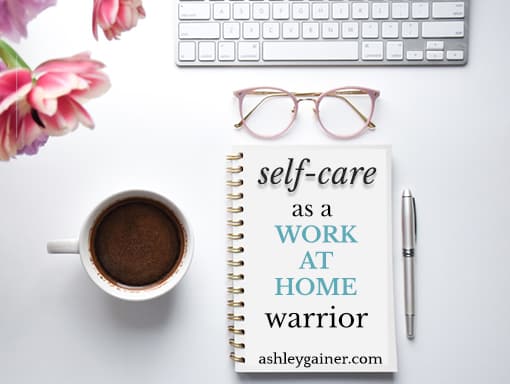If there’s one thing I’ve learned this year, it’s that if I go down… everything goes down. I’ve been focusing on ramping up my self-care routines, which aren’t a pedicure and massage. My top 10 practical ways to self-care are specifically for the work-at-home warriors among us.
1. Get enough sleep
This is number one on my list for self-care. If I don’t get enough sleep, I’m irritable, I snap at my kids, and it’s harder to get my work done. When I do get enough sleep, I can cope with life better. I can’t control what time my kids wake up in the morning, but I can control what time I go to sleep at night.
Of course, any parent with small children knows how easy this is to say and how hard this is to actually do. When your house is a wreck, you have more work to do, or you just want some time to yourself, you might be tempted to trade sleep for one of these things. But it is better for your health to prioritize sleep the majority of the time. And parents of babies (that’s me right now!), try to slip in a nap here and there if your nighttime sleep is broken up.
2. Eat well
This is another one that’s hard for parents. Mealtimes with kids can be chaotic, so it’s easier for me to skip breakfast (or eat a piece of chocolate!) in the morning than make myself something healthy. At lunchtime I might grab a bowl of cereal rather than fix a salad/rabbit food.
But I find that when I do make the effort to take my vitamins and eat to fuel my body for the activities that I want to be doing rather than just taking the edge off of hunger, I feel and do better. Surprising, I know.
3. Drink your water
Drinking enough water goes in tandem with eating well. Even if I can’t manage to eat optimally for a day, I do try to drink my water. Hydration is a huge part of self-care. Cognitively, physically, and emotionally, our bodies need water to function. And we tend to run dehydrated, especially if you’re drinking coffee.
Now I’m not going to tell you to give up coffee–I’m not looking for an angry mom! But when you get enough water into your system, everything just runs better. I have a 32-ounce water jug on my desk–if you’ve seen my Facebook lives, you’ve probably seen it (The Ink Well Guild with Ashley Gainer).
4. Give yourself chunks of time
For those of us who work from home, having real chunks of time to concentrate on only work is wonderful. You might have to be intentional about this if you have kids. I’m blessed to have family nearby, so I can have cousins or grandparents help out sometimes by taking the kids for a couple of hours.
If you don’t have family to help out, and you can swing it financially at all, getting a babysitter at least sometimes can really benefit you. If you’re without financial resources or family, it’s very tough–but try to intentionally block out a bit of time, even 30 minutes a day while the kids watch a video (and you wear headphones!).
A chunk of time to concentrate without interruptions from kids or excessive background noise to focus on your writing, or whatever needs deep-brain work, is one of the practical ways to self-care. For more tips, see this post: Working From Home In The Midst Of Chaos.
5. Fire your brain
Stop trying to make your brain work so hard by remembering everything. Instead, write it down! Then you can let go of that pressure. The more you can take off your own shoulders and put down on a piece of paper, the better off you’re going to be.
You can actually write things down on paper in a notebook, or you can use a list on your phone, or online on your computer. Whatever works the best for you, is a practical way to self-care!
6. Set up systems
Setting up systems is kind of like firing your brain. It’s about easing up on the amount of stress on you. When I was starting out, I had simple systems–a spreadsheet, calendar reminders, emails, routines.
Where I’m at in my business now is letting the robots take care of as much as possible. I have more business and more moving parts to the business, so I automate as much as I can. For example, I just started using Dubsado for client management. I’m still figuring it out (hello, learning curve!) but already I can tell how much of a brain-saver it’s going to be.
7. Automate payment reminders
Another brain helper is invoicing software with automatic payment reminders built in. You can set up templates so that the software sends things to your clients and you don’t have to be the one typing up individual email reminders to them. There’s lots of choices: Freshbooks, Wave, Quickbooks, probably more.
You expend less mental energy, and you’re not chasing people down for money. I don’t enjoy that and I don’t think most people do!
8. Make friends
Leaning in, on, or towards whatever direction, you need support. You may work from home alone, but it’s very hard to do so for long without some kind of support. And yes, real life support is great (see “chunks of time” above), but you can also get virtual strength and encouragement.
I find this in a few places. I have a mastermind group (peers/colleagues) where I can get support and advice. I also have a high-end student group in which I can really be myself (and my students can as well) because a lot of us now know each other well from hanging out in the group for a few years. We can get goofy together.
My other online friends and I hang out on Facebook, Instagram, and Voxer. I usually see some of these people only once a year at conferences. We boost each others’ morale. Having outside support is a tremendous way you can take care of yourself.
9. Ask questions (but don’t make us be your Google)
A benefit of having online friends is that when you’re stuck, you can ask questions, such as in my free Facebook group. People have been there before and they want to help you. Obviously, if a simple Google search will give you a quick answer, don’t bother asking the question.
Do a couple minutes of due diligence on Google first, then bring it to the group if it’s more complicated. The reason this is a practical way to self-care is that you’re getting your question answered faster than if you never asked anybody. You didn’t waste hours or days on the internet trying to find out. You were willing to ask for help.
10. Do your bookkeeping and give yourself a bit of business spending money
When you know your numbers, it’s such a relief. The numbers are: how much money you have, how much money you are expecting, how much you’ve already spent, and how much you have to put towards something. When you’re on top of your numbers, you know if you need to work a little harder to meet your monthly income goal, or if you can take a day off.
You can even give yourself a bit of “fun money” in your business. This means a business book you want to read, a course to improve your skills, or a new laptop when your old one dies. Even 5 bucks to buy a nice pen is a treat if you’ve been slogging away for a while. You’re proactively taking care of yourself, which is self-care.
Self-care doesn’t necessarily equal fun and indulgence. Practical ways to self-care for work-at-home warriors mean taking care of things that are essential.





